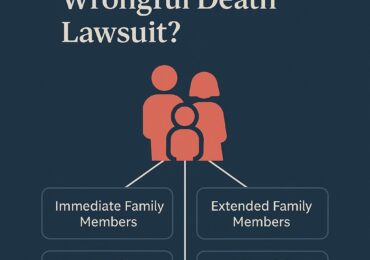In the aftermath of a loved one’s untimely demise, navigating the complexities of legal recourse can be a daunting task. As you seek to understand your rights, a pressing question arises: Who can file a wrongful death lawsuit? When looking for atlanta wrongful death attorneys, this article delves into the intricacies of eligibility and the criteria determining your ability to pursue justice on behalf of the deceased.
Understanding Wrongful Death Lawsuits
Defining Wrongful Death
A wrongful death lawsuit occurs when someone dies due to another party’s negligence or intentional harm. This civil action aims to compensate the deceased’s survivors or estate. Unlike criminal cases, which focus on punishment, wrongful death suits seek monetary damages for the loss endured by the family.
Legal Grounds for Filing
To file the claim, specific legal grounds must be met. The plaintiff must demonstrate that the defendant’s actions directly caused the death and that these actions were either negligent or intentional. Evidence such as eyewitness accounts, expert testimonies, and documentation of negligence often plays a crucial role in building a compelling case.
Potential Damages
Compensation in these lawsuits can cover various losses, including funeral expenses, loss of income, and emotional distress. Additionally, plaintiffs might seek damages for loss of companionship and support, which are invaluable to the survivors. Each case is unique, and the awarded amount depends on the incident’s circumstances and its impact on the surviving family members.
Who Can File a Wrongful Death Lawsuit: Eligibility Criteria
Immediate Family Members
In most jurisdictions, the right to file a wrongful death lawsuit primarily rests with immediate family members. This typically includes spouses, children, and parents of the deceased. The rationale behind this is the presumption that these individuals have suffered the most significant emotional and financial loss due to the death.
Extended Family Considerations
In some cases, extended family members such as siblings or grandparents may also have the eligibility to file a wrongful death claim. This usually occurs if they can demonstrate a significant dependence on the deceased financially or emotionally.
Legal Guardians and Financial Dependents
Additionally, individuals who acted as legal guardians or those who were financially dependent on the deceased might also possess the right to pursue a claim. The primary consideration here is the level of dependency and the nature of the relationship with the deceased.
Key Factors That Affect Wrongful Death Claims
Legal Standing and Relationships
To file a wrongful death claim, it’s imperative to establish the plaintiff’s legal standing. Typically, immediate family members such as spouses, children, and parents hold this right. Extended family members may also qualify under certain jurisdictions, depending on their dependency on the deceased.
Statute of Limitations
Timing is another critical factor. Each state enforces a statute of limitations, a timeframe within which a lawsuit must be filed. Failing to meet this deadline could nullify the claim, regardless of its validity.
Evidence and Liability
The success of a wrongful death claim hinges on compelling evidence. Establishing the defendant’s negligence or intentional harm is crucial, often requiring comprehensive documentation and expert testimony to substantiate these claims.
Legal Process for Filing a Wrongful Death Lawsuit
Understanding the Legal Framework
Navigating the legal process of a lawsuit involves understanding complex legal frameworks. Initially, the claimant must be recognized as an eligible party, often a close family member or representative of the deceased’s estate. This eligibility is crucial as it forms the basis for the lawsuit.
Filing the Complaint
The process begins with filing a formal complaint in the appropriate court. This document outlines the allegations, identifies the responsible parties, and states the damages sought. Adhering to state-specific statutes of limitations, which dictate the timeframe for filing lawsuits, is imperative.
The Role of Evidence
Compelling evidence is the backbone of a successful claim. Evidence may include medical records, expert testimonials, and accident reports. These elements substantiate the claim and demonstrate negligence or misconduct leading to the death.
Court Proceedings and Resolution
Once filed, the lawsuit proceeds through pre-trial motions, discovery, and, if necessary, a trial. Many cases resolve through settlements, but a trial may be necessary if disputes arise. The ultimate goal is to achieve justice and monetary compensation for the deceased’s beneficiaries.
Common Challenges in Wrongful Death Lawsuits and How to Overcome Them
Navigating Complex Legal Procedures
Lawsuits often involve intricate legal procedures that can be daunting. Understanding the process is crucial. Collaborate closely with your legal representative to meet all filing deadlines and procedural requirements. An experienced attorney can help you navigate the complexities and avoid potential pitfalls.
Proving Negligence or Misconduct
Proving negligence or misconduct is another significant hurdle. To build a strong case, gather comprehensive evidence, including medical records, eyewitness testimonies, and expert opinions. Working with skilled investigators can bolster your ability to establish the liable party’s responsibility.
Coping With Emotional Strain
The emotional toll of a wrongful death case can be overwhelming. Seek support from family, friends, or professional counselors to manage stress and grief. Remember, maintaining emotional resilience is essential for making informed legal decisions.
Final Thoughts
Navigating the complex landscape of wrongful death lawsuits, understanding eligibility and criteria is paramount to pursuing justice. As someone potentially affected by such a tragic event, you must be informed about who can file a claim, encompassing immediate family members, domestic partners, and other dependents. When looking for atlanta wrongful death attorneys, by recognizing the legal requirements and the nuances involved, you empower yourself to advocate effectively in the face of loss.
